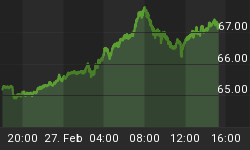Forty months and thirteen Federal Funds rate cuts later and all we've managed to accomplish is sustenance of unsustainable and unprecedented "Credit Bubbles".
US M3 money stock has been inflated only to circulate widening external distortions to out Current Account deficit.
M3's rate of change is telling an increasingly disturbing story:

The Federal Reserve began backpedaling prior to 2002, regardless of the aggregate growth implied by M3, the rate of change makes clear the Fed's recognition of policy failures. Even after having patted themselves on the back, it's clear several events should have taken place were the fed not drinking from it's own punch bowl.
The Fed would be:
- selling bonds
- raising the reserve ratio
- raising the discount rate
They are committing he polar opposite of the above.
Aggressive interest rate reduction and credit/debt expansion policies adjacent to unprecedented growth in M3 has ONLY succeeded in blowing a massive credit bubble of global proportions and none of the above is about to change in any meaningful way unitl August.
Changes in the money supply, in turn, affect interest rates, but the rate of change the reveals the delicate balance. When the Fed sells securities and decreases money supply, there is upward pressure on the federal funds rate, yet the Federal Reserve's own balance sheet has grown precipitously over the course of these studies.
In order to sustain this fiasco, Doug Noland's "Tightening Lite" thesis appears plausible:
"The Credit-induced "reflationary" boom and attendant inflationary forces (building for months) have finally captured the attention of the bond market. Apparently, the bond market now cares because it assumes the Fed cares. How much the Fed "cares," at this juncture, is unclear. There is still no sign that a rate increase is imminent, with Fed officials seeming to signal this week that they would like to remain patient. I have no doubt they hope to remain patient."
Patience has manifested itself in the chart below, we have flat lined on the rate of change and any extraordinary adjustment will most likely cause ill effects:

The Federal Reserve will continue to buy bonds and at minimum, maintain the reserve ratio while perhaps "tweaking" the discount rate.
We can expect further deterioration of the Economic Environment for the foreseeable future.
The Fed will merely begin to accelerate it's "visible" hand going forward. Desperate times require desperate measures.















